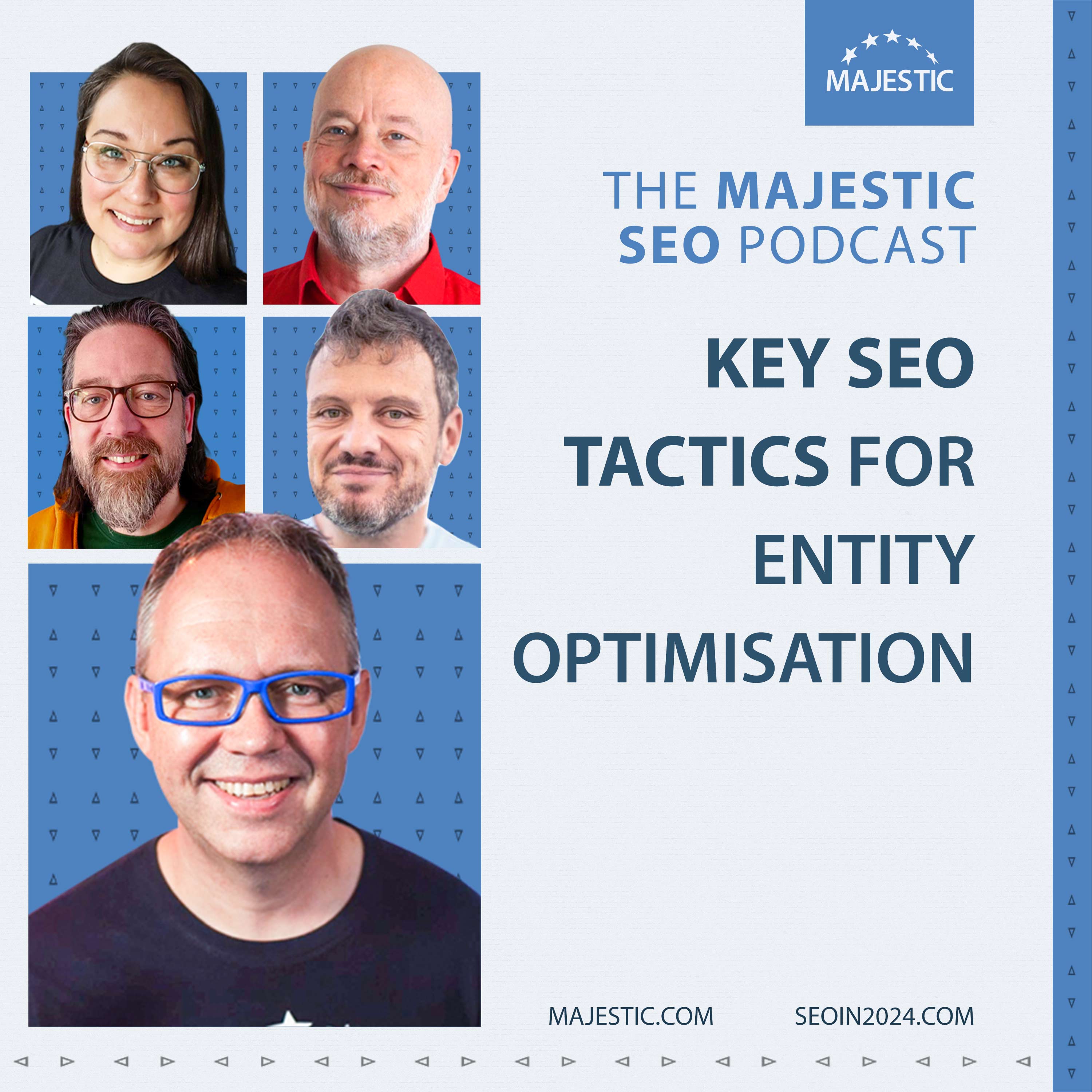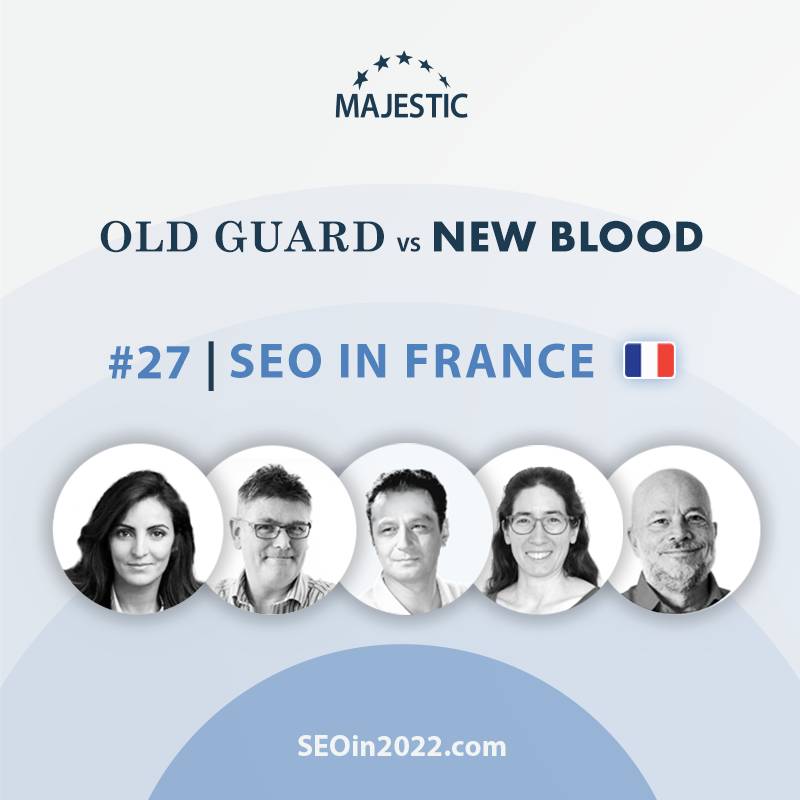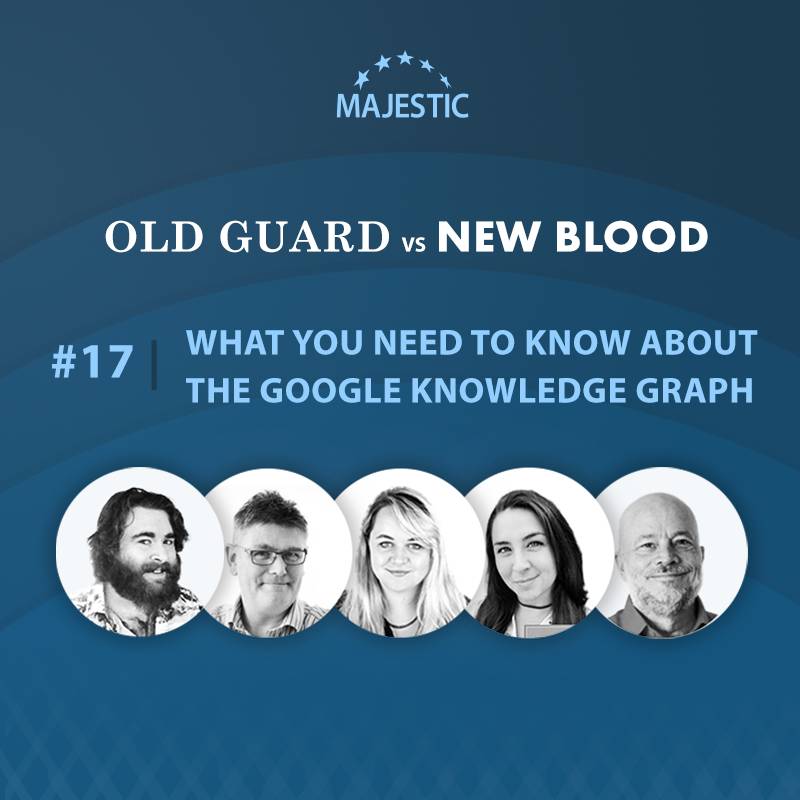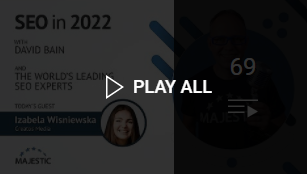-
Site Explorer
- Majestic
- Summary
- Ref Domains
- Backlinks
 New
New Lost
Lost- Context
- Anchor Text
- Pages
- Topics
- Link Graph
- Related Sites
- Advanced Tools
- Author ExplorerBeta
- Summary
- Similar Profiles
- Profile Backlinks
- Attributions
- Compare
-
Link Tools
- My Majestic
- Recent Activity
- Reports
- Campaigns
- Verified Domains
- OpenApps
- API Keys
- Keywords
- Keyword Generator
- Keyword Checker
- Search Explorer
- Link Tools
- Bulk Backlinks
- Neighbourhood Checker
- Submit URLs
- Experimental
- Index Merger
- Link Profile Fight
- Mutual Links
- Solo Links
- PDF Report
- Typo Domain
- Free SEO Tools
- Support
Educate Google about your brand
Jason Barnard
Jason agrees with Gus that brand is key - and shares that you need to communicate what you do to Google as clearly as possible.
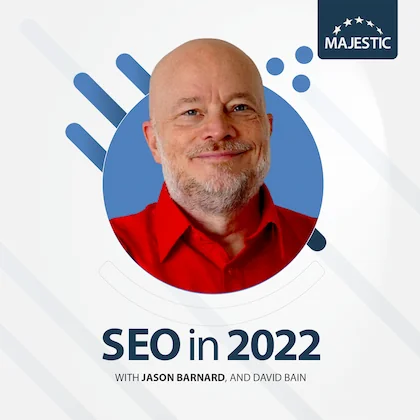
Educate Google about your brand
Jason says: "You need to educate Google about who you are, what you do, and who your audience is. That is the fundamental building block, on which everything else can be built."
How do you let Google know who you are?
"An important factor to consider is that Google has probably already gathered information on who you are from what you have on your site, your profile pages, and your LinkedIn page. However, you probably haven't communicated that information sufficiently, or consistently enough, for the machine to truly have a grasp of it. Not only does Google need to understand who you are, what you do, and who your audience is - but it needs to be confident in that understanding."
How do you ensure Google has that confidence?
"Think of it like educating a child. A child doesn't understand a concept when you teach it straight away. Education requires multiple elements, one of which is repetition. However, repeating the same thing in different ways can be quite confusing, and the same is true for a machine. The trick to getting the machine to become confident in its understanding, is to repeat the same thing on multiple platforms in the same manner. If you say one thing on your website, you need to say the same thing on Crunchbase and LinkedIn.
Another important factor is language. If you speak to a child using words it doesn't understand, or in a language it doesn't understand, there are going to be problems. Google's native language is schema markup. You want to repeat the information on your website using schema markup, because this explicitly restates what you're already saying, but in Google's native language. That's phenomenally important. However, schema markup is only repeating it once. You need that repetition from all sources that Google is listening to."
Is it important to have schema markup on other pages, as well as the About Us page, or is that the most important by far?
"It depends. Google is trying to identify the Entity Home. John Mueller talks about this problem as reconciliation. It's a very simple problem that we, as the 'responsible adults', can help to solve. The information about you around the web is fragmented and contradictory, so it's very confusing. You need to identify where you can allow this machine to see the defragmented version. Google is actively looking for this Entity Home to reconcile the contradictory information to the version from your site.
Google will tend to go to the homepage, because the homepage is the most powerful, but that's not your best bet. You want to attract Google's attention and drag it away to the About Us page. There, you can be factual about your key information in a way a machine can understand. On the About Us page, you don't need to try and impress, or direct, a human audience in the same way you do on the homepage. There, you can state your key information on the page, and in the schema markup, and you can point to all the corroborative sources such as, LinkedIn, Crunchbase, and Wikipedia. All of these places will confirm who you are, what you're doing and who your audience is."
When it comes to giving Google confidence about what you do, will you need to bring in other content sources outside the About Us page?
"You can state what you do in simple terms. For example, Kalicube is a company that provides consulting services in the SaaS platform for brands who want to optimise their brand SERP and improve their knowledge panel. That states the basics, but what I actually do is much more detailed and nuanced. Kalicube is part of SEO, it's got the brand SERP, it has different rich elements like video boxes, Twitter boxes, and knowledge panels. There are a lot of nuanced details. That is what the rest of the site will describe, where you might potentially provide a solution to Google's users - which is the trick for SEO.
On your About Us page, you are giving the basic core message of what you do. The rest of the site gives the detailed messages that inform where Google might be offering individual specific solutions. John Mueller recently said that your content that doesn't drive traffic is still useful, because it helps Google to understand what you do. Informative pages, like large FAQ sections, may or may not drive traffic, but I'm fundamentally convinced the existence of these pages is supporting evidence for Google. It is evidence that you are experts, you're authoritative, you're trustworthy within your industry and that Google can trust you."
Should you maintain pages in your site, that don't get traffic or have any external links pointing to them, because they could still provide a useful service to Google?
"We have a client called Ubigi, who do an eSIM offer. We built up an FAQ section for them and we did no link building at all. Now, we outrank Apple for the short head term 'eSIM' with no links at all. That indicates that we serve Google's audience with answers to questions around eSIMs, in a way that shows we are truly an authority. Apple, on the other hand, is hedging their bets because they do a lot of other, different things. You can definitely rank for short head terms with no links."
How do you get Google to know who your audience is, and can that be done on-site?
"You start by stating what it is that you want the Google 'child' to understand. The 'child' will then get the corroborating information, to understand and become confident it has understood. If I state who I am to a child, then the teacher says it, and then the policewoman says it, the child has understood and is confident. I'm coming at the same idea from a brand perspective. If you want to build a solid SEO strategy, or even a digital marketing strategy, you need that fundamental understanding from these machines.
It is Google principally, but it's also Facebook, Apple, and Amazon. These machines are all trying to understand the world, and they're all going about it in a similar manner. You need to make sure they know that you are the authority, and you are telling the truth about yourself. That will apply to everything you're doing, on every page. If the machine understands what's on the page, what it offers to the user, and who the audience is going to be, then it can offer you up as a solution to its users when they're searching relevant terms."
What is the process that leads to Google adding your information to the Knowledge Graph and triggering a knowledge panel, and what is the value of getting one for your business?
"The knowledge panel, from a human perspective, is significant because when somebody searches your brand name, they see a big panel full of information - you look impressive. You look more impressive than if you don't have one. You can consider it to be part of your 'Google business card', which is what your audience sees when they search your brand name.
Google's reason for putting up a knowledge panel is that they bring information together from all around web, they defragment it, and they put it up as a reconciled version that they have built themselves. The panel shows the information that Google has understood about a company, and it is being presented so that a user can read it. The user doesn't need to click through to multiple results to get all that information. For Google, the panel simply makes their users' experience better.
Your aim is for Google to represent your brand in a manner you think is relevant, helpful, and valuable to your audience - and is truthful about who you are and what you do. You need to take control, you need to manage it, and you need to educate Google. The Knowledge Graph is Google's understanding of the world - its 'education'. Your responsibility is to look after your tiny corner of the internet. Once Google is confident it's understood what you are teaching it, then it will trigger the knowledge panel.
Another factor is probability. If you have an ambiguous brand name, then getting that knowledge panel to appear becomes quite difficult, because the probability that a user is searching for you, specifically, is not as clear as it is when you've got a completely unambiguous name.
For the Knowledge Graph, you are looking at understanding and confidence. For the knowledge panel, you are looking at understanding, confidence, and probability."
How do you go from being a recognisable brand to being a brand leader? What takes Google from being confident about who you are to thinking you're one of the best at what you do?
"I've noticed that confidence in understanding is a big driving force for Google. If a child is learning something new, they don't go into the playground and shout about it if they are unsure. However, if they're incredibly confident about what they've learned, then they shout it out so the whole world can hear. Developing Google's confidence in its understanding will already put you a step ahead of the competition.
Another factor is what I call credibility, and what Google are calling expertise, authority, and trust. For any SEO, expertise, authority, and trust makes a lot of sense. For most people, credibility makes more sense. Are you a credible solution for Google's user or, more crucially, for the subset of Google's users who are your audience? Google is trying to match that subset to the audience you can actually serve. If it's confident that it's understood who your audience is, and what you can offer them, that's already a big plus. If it's confident that you are a more credible solution for its users than the competition, you've won the game."
What can an SEO consider moving away from to focus more time on educating Google?
"When I tell brands to write a description about their company, stick to it, and repeat it until it is understood by the Google 'child', they see it as duplicate content. They insist they need to write different versions to avoid duplication. However, the problem with duplicate content was plagiarism, and attributing the correct source. Google always wanted to rank the original source and not the copies. In this case, you are the original source, and you're copying yourself. From an education point of view, if you're saying something in one way in one place, and then reiterating it differently in another, the child will get confused.
I did an experiment about a year ago where I took the same exact text, and I spread it across the entire web - probably 100 references to me, personally. One of the things that I thought might happen would be that Google would then demote some of the results on my brand SERP because it was repetitive. It didn't, it kept the same results. It just pulled different chunks out of the pages, put them in the meta description, and moved the title around. Google recognises that these are good representations of you as a brand and they are helpful, valuable, and useful to your audience. It will look through the different things that you do, and that you represent to your audience, and determine what feels most relevant for each of its results. Let Google do the work - why waste your time?"
You can find Jason Barnard over at JasonBarnard.com.
Also with Jason Barnard
Choose Your Own Learning Style
 Video
Video
If you like to get up-close with your favourite SEO experts, these one-to-one interviews might just be for you.
Watch all of our episodes, FREE, on our dedicated SEO in 2022 playlist.
 Podcast
Podcast
Maybe you are more of a listener than a watcher, or prefer to learn while you commute.
SEO in 2022 is available now via all the usual podcast platforms
Don't miss out
Opt-in to receive email updates.
It's the fastest way to find out more about SEO in 2025.
Could we improve this page for you? Please tell us





